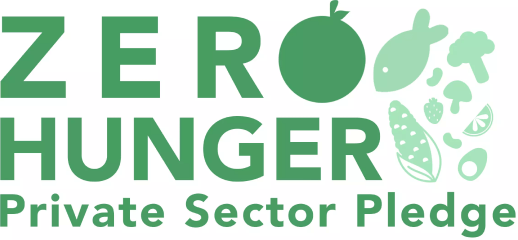
56 companies united under the Zero Hunger Private Sector Pledge to end hunger and enhance nutrition
The Zero Hunger Private Sector Pledge reiterates its call for private sector involvement in the global effort to achieve SDG 2 – Zero Hunger.
This month, three new companies from different parts of the world have joined the Zero Hunger Pledge: AgroZee Organics from India, Le Lionceau from Senegal and Food Health Systems Advisory from Nigeria.
AgroZee Organics is the first Indian company and Le Lionceau is the first Senegalese company to join this initiative, further extending the reach of the pledge, with 50 countries targeted and 56 companies committed to eradicating hunger by 2030.
Welcoming the new Pledge companies
AgroZee Organics works with HarvestPlus, a US-based NGO, to implement the Nutri Pathshala model in India. This model aims to enhance school children’s nutrition by integrating locally procured biofortified grains into school meals. Over the past two years, they have reached 65,000 school children and are now aiming to reach 2 million over the next three years.
This project, conducted in partnership with the Indian government, also aims to reduce post-harvest losses.
The company plans to explore replicating and scaling the model in other regions of India, as well as in Mali, Nigeria and Kenya.
Le Lionceau is a social enterprise dedicated to producing nutritious baby food from locally sourced ingredients. By focusing on combating malnutrition, reducing food waste and strengthening the local food value chain, Le Lionceau is making significant strides in empowering women and promoting sustainable practices.
Their product range includes purees, infant flour and biscuits, all designed to meet the nutritional needs of babies. Additionally, Le Lionceau conducts educational workshops to highlight the importance of maternal and infant nutrition, locally sourced foods and sustainability. Among others, the company partnered and has been supported by USAID, the EU, UN Women and GIZ.
Through the Zero Hunger Pledge, the company commits to offer trainings to provide rural youth with useful skills and invest in research and development primarily focused on women. Le Lionceau also commits to implementing agricultural innovative interventions to support sustainable practices and climate resilience.
Food Health Systems Advisory is a consultancy firm based in Nigeria, with extensive experience advising food businesses on issues related to profitability, safety, nutrition and sustainability. Having worked with organisations like GAIN, the Gates Foundation, and the Global Alliance for the Future of Food (GAFF), as well as various small and medium-sized enterprises, they are well-equipped to support food processors and small enterprises in their journey towards a more sustainable and impactful food system.
Their pledge specifically focuses on providing expert services to help these businesses thrive while contributing to the broader goal of ending hunger.
With the addition of these three companies, the Zero Hunger Pledge continues to expand its global reach and reiterates its invitation to companies of all sizes and from all across the world to join this movement and make a lasting impact in the fight against hunger and malnutrition.
Discover the Zero Hunger Pledge and make your own pledge here.
The agrifood private sector gathers in Kigali
Le Lionceau and Food Health Systems Advisory, along with other African pledgers and key stakeholders in the agrifood sector, will gather in Kigali, Rwanda, this week to discuss strategies for mobilising investments that foster equitable, sustainable and nutritious food systems on the continent during the side event co-organised by the Zero Hunger Pledge and partners on Monday 2 September and will also have the opportunity to discuss and reflect on the challenges they face within global agriculture and food supply chains in the context of climate and economic uncertainty during the roundtable discussion organised by the Zero Hunger Private Sector Pledge on Wednesday 4 September.
As these two new companies led by women demonstrate, the side event will also focus on the critical role of women and youth in transforming food systems and the importance of supporting businesses that prioritise nutritious food production.
